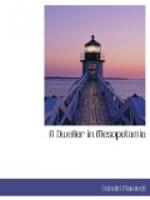“The slave of the lamp,” he cried, “calling up spirits from the vasty mud. I don’t believe this engine is real, but it will do to get us into Baghdad.”
And it did. We found a soldier driver and a stoker, got leave from headquarters to use the engine to run into Baghdad West, hurled our bags on to the coal in the tender and were transported unscathed by further mud to the quay by the waters of the Tigris. It was too dark to see much. A multitude of steamboats and mahailas lined the shore. The river was in flood and looked black and forbidding, and it was impossible to see across to the other side. The only light was supplied by a few electric lamps at intervals along the road. It still rained dismally and we made for a canteen close at hand. Here we felt quite at home, for there were several other arrivals as muddy as we were and even worse. Considering this was only a restaurant attached to a rest camp, we fared very well. Our baggage we left there and set out on foot to try and reach Navy House, which was the other side of the river. There were two boat-bridges we were told, and the upper one would lead us into the right quarter. The old Navy House, near to G.H.Q., was now used by some one else, and the British Navy, shrunk to very small proportions as far as Baghdad was concerned, “carried on” in a back street.
[Illustration: “A magic vignette of palms, Eastern buildings and a large South Western Railway engine.”]
Our first check was at the bridge. Owing to the river being in flood, it was open, that is, the middle section had been floated out, for fear that the hawsers would not stand the strain and the only road across was the Maude Bridge lower down.
Brown was delighted. The rain had stopped and he anticipated adventure. The idea of getting across the river in a goufa flashed across his mind, but a glance at the foaming, tearing water was sufficient deterrent even to an optimist like Brown. It might be done in daylight, but at night it would be suicide.
We decided to make our way through the narrow streets that led by the side of the river until we struck the main road that approached the bridge of boats half a mile or so down. In theory this sounded very feasible, but in practice, owing to the tortuous nature of the ways and to the fact that it was very dark, we soon got lost. Twice, when we thought we were progressing well, we came upon the same place again. Then we struck the river, more or less by accident, and took fresh bearings of the general direction we were to pursue.
We plunged into a covered way, arched overhead like a cloister. This had the advantage of being dry and our speed increased considerably. From time to time a dim light gave a glimmer to show us the way.
[Illustration: “Suddenly we came upon a scene of strange beauty and dramatic effect.”]
It was late and there were few people about. The figures that flitted by were silent and mysterious. A window here and there was lighted up, but for the most part the houses were dark and without sign of life. We found no “splendours of the golden prime of good Haroun Alraschid,” but for all that the narrow streets looked romantic and weird. The sky had cleared and the moonlight had given a glamour of phantasy to the vistas of the street.




